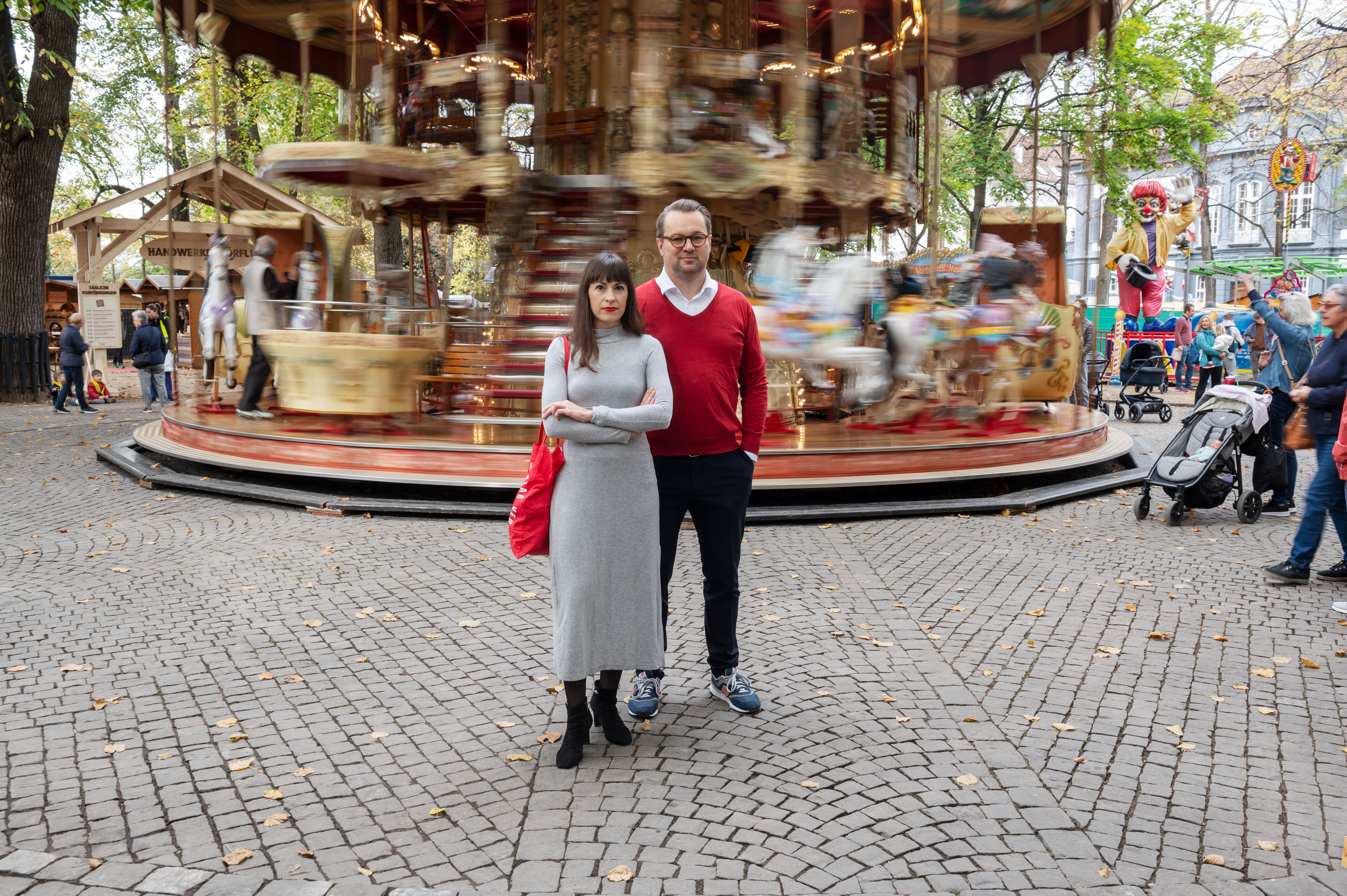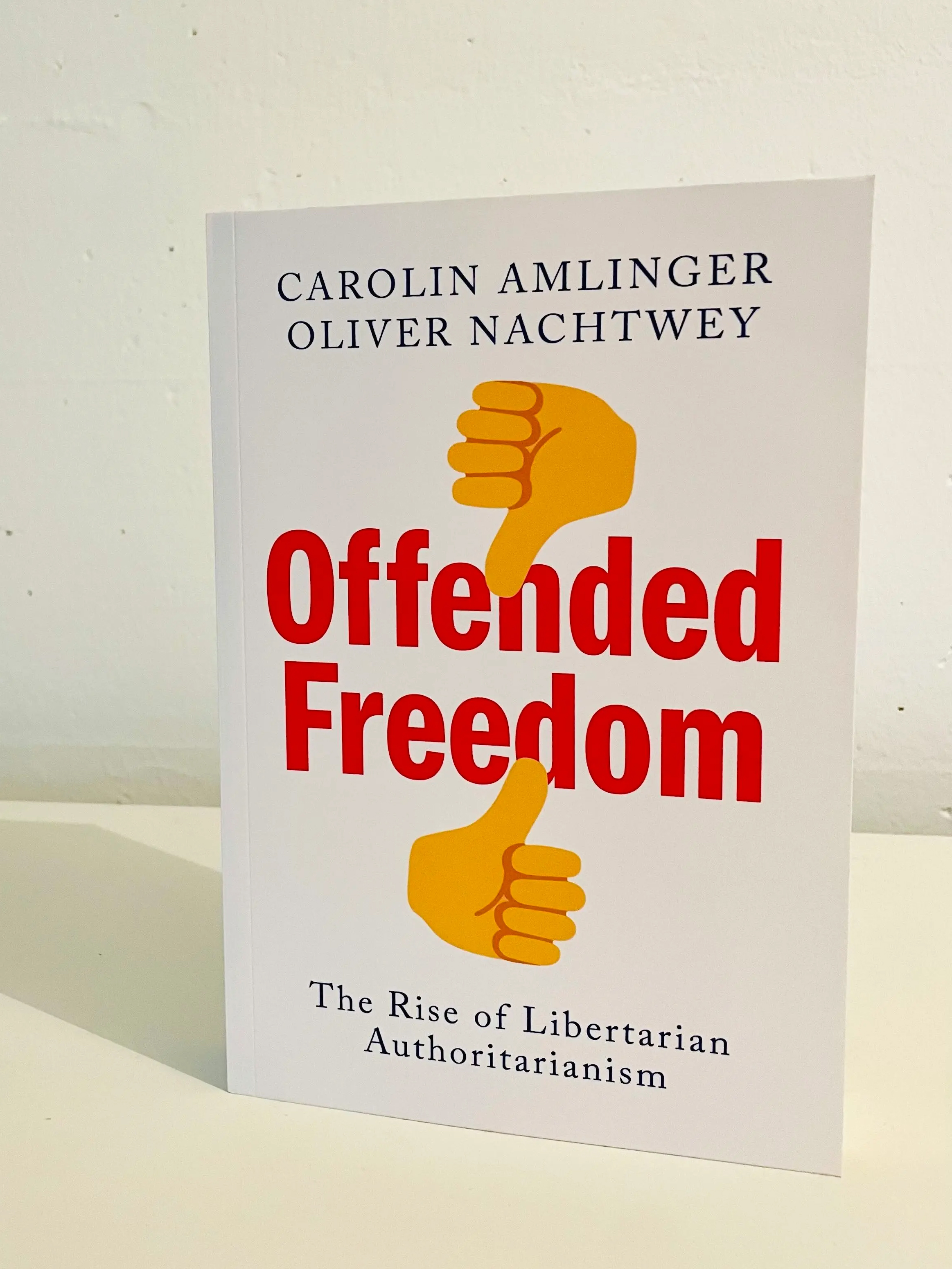Why some people turn to authoritarianism in the name of freedom

The Basel-based sociologists Carolin Amlinger and Oliver Nachtwey have explained – using the examples of opponents of Covid-19 measures and former peace and environmental activists – the emergence of a new type of anti-democratic figure.
Just six days after the storming of the US Capitol on January 6, 2021, prominent historian Quinn Slobodian and Harvard political scientist William Callison tried to make sense of what had happened in the Boston ReviewExternal link. Just who were the insurgents who had stormed and vandalised the Capitol building? The brightly painted Vikings and cowboys didn’t fit the usual image of far-right vandals. They seemed more like people who wanted to be perceived as individuals.
Slobodian and Callison recognised a political dynamic among many of those involved in the riots which they called “diagonalism”. They coined the term from the term “diagonal thinkers”, as the radical opponents of Covid-19 pandemic measures in German-speaking countries called themselves.
“At the extreme end, diagonal movements share a conviction that all power is conspiracy,” Slobodian and Callison wrote. Many of them believe that public power cannot be legitimate. In many ways, they are “descendants of the extra-parliamentary New Social Movements of the 1970s” who have shifted from left to right – without idealism or the desire for collective action and liberation.
Slobodian and Callison also referred to a study by the University of Basel, led by the sociologist Oliver Nachtwey, on the radical opponents of Covid-19 measures.

From cosmopolitans to ardent far-right supporters
Nachtwey and his team were the first to analyse the attitudes of opponents of Covid measures in Germany, Austria and Switzerland. They concluded that some of the protesters originally came from left-wing and ecological circles, but had evolved to now only trust far-right parties – if anybody.
In an interview with SWI swissinfo.ch, Amlinger and Nachtwey recall their initial surprise on realising that there are people “who saw themselves as cosmopolitans and who are now strong supporters of the Alternative for Germany (AfD)”.
Nachtwey encountered something similar back in 2017 in interviews with supporters of the German online campaign platform Campact. The platform advocates “progressive politics”, often on environmental and social issues. So it was all the more surprising when some of the platform’s own supporters expressed outrage over a petition against the far-right AfD.

More
Trump, Biden and hatred: how US polarisation affects Americans in Switzerland
Joe Rogan, Robert F. Kennedy, and the ‘world’s coolest dictator’
During the pandemic, Amlinger researched how and why some German intellectuals were sliding from liberal positions towards right-wing authoritarianism. The sociologists Amlinger and Nachtwey – who in private life are a couple – discussed their research topics and started to wonder: “are we actually both looking at the same phenomenon?” That is, people who adopt authoritarian positions in the name of freedom – and the question of how and why this happens.
The ensuing discussions resulted in the jointly authored book Offended Freedom: The Rise of Libertarian Authoritarianism, the English translation of which has just come out in the UK. It will also be published in the US in February.
Offended Freedom is based on interviews in German-speaking countries, but it creates links with other international phenomena which seemed like political outliers for many: the popular US podcaster Joe Rogan, for example, who backed left-wing Democrat Bernie Sanders in 2020 before supporting Donald Trump in 2024; Bitcoin fans who enthused about the “world’s coolest dictator” in El Salvador; or the enthusiasm for anti-vaccination figure Robert F. Kennedy.
Amlinger and Nachtwey describe supporters of authoritarian politics and politicians who do not see themselves as followers of a leader, but as individualists and rebels. “Many of those interviewed described the feeling that they no longer understood the world because it had turned against them,” Amlinger explains.

‘Like foreigners in our own country’
Many had suffered specific grievances. Amlinger gives the example of someone who was refused service by migrant workers at a petrol station. “Many use the phrase ‘foreigners in our own country’. And they blame migrants or non-binary people for this sense of alienation,” she says.
However, the feeling of alienation and offence stems from other causes, Amlinger and Nachtwey claim. In particular, it derives from the unfulfilled promise of social advancement and the weakening of civil society. “Modern society is a fiendish construct,” Nachtwey says. “On the one hand, many people are better off. For instance, it’s no longer the norm for four children to share a room. But on the other hand, individualism conveys a promise of advancement which – in Germany, for example – no longer works.”
At the same time, the role of “places which build a sense of community”, such as trade unions, clubs and churches, is waning.
From ‘post-democracy’ to ‘offended freedom’
The British political scientist Colin Crouch recommended Offended Freedom to its English-language publisher for translation.
Crouch’s most famous work is Post-Democracy, which at the turn of the millennium made him a favourite author among those who wanted to understand political developments from a left-wing perspective. Today, Canadian sociologist Slobodian and – now also accessible in the English-speaking world – Amlinger and Nachtwey occupy a similar role.

At the time, Post-Democracy traced how democratic discourse was disappearing due to the professionalisation of public relations thinking and the influence of private television. Offended Freedom can now be read as explaining the reciprocal effect of this development described by Crouch 25 years ago.
Many people are lonely and their prospects do not look bright. “In the 1960s, the thinking was: ‘My children will at some point be better off’,” says Nachtwey. “But today, in countries like Germany, the promise of social advancement no longer works.” The future no longer seems like something to be actively designed, because “even those in denial secretly know that climate change is striding forwards”.
Why the fascination with Musk?
It seems fitting that Offended Freedom will be published in the US in February. In the first few weeks of 2025, Elon Musk got involved in the politics of many countries. The multi-billionaire in the new Trump administration has himself followed a diagonal political path – from an economic liberal with progressive views to a “chief amplifier of authoritarianism”. This is how Amlinger and Nachtwey recently described him in the conservative German paper, the Frankfurter Allgemeine Zeitung. The Basel sociologists often feature in the German media, for instance to explain Javier Milei’s success in Argentina – or the Musk phenomenon.
“When Elon Musk gives right-wing extremists a platform, this ties into the idea of disruptiveness: that liberal democracies and their institutions must first be destroyed in order to build something new and different,” Amlinger says.
The idea of creative destruction is now being transferred to the shaping of society. This appeals to many people on an emotional level, “because they have the feeling in everyday life that society is paralysed, at a standstill, not developing at all or developing in the wrong direction,” says Amlinger. “Rebels already appeared in the classic critical theory of the 1930s and 1940s – but as fringe figures,” says Nachtwey. “Today they are no longer on the fringe.”
Criticism of Offended Freedom
Many German-language media published highly favourable reviews of Offended Freedom. The Süddeutsche Zeitung called the book “almost a page-turner”, thanks to the breadth of its theory and scope of its ambitions.

The liberal Neue Zürcher Zeitung, meanwhile, took a more critical view. Although the work is “theoretically original, empirically substantiated and accessibly written”, the authors’ own definition of freedom places too much importance on solidarity, the reviewer concluded. This leads to a lack of understanding for those who rebelled against the restrictions on freedom during the pandemic – for instance the fact that, over a given period, only those who had been vaccinated against or had recovered from Covid-19 were allowed into all shops in Germany.
According to the NZZ reviewer, the social sciences in Germany are coloured by these experiences, giving rise to a different type of debate than in the English-speaking world. The Basel sociologists’ view of “negative freedoms” – that is, freedom from restrictions – is too critical: “it is not freedom but its restriction that needs to be justified”, the review stated.
The understanding of freedom may be open to dispute, but reality is not. Like Slobodian in his analysis of the vandals who stormed the Capitol, Offended Freedom also reveals the paranoid worldview that many of these new, libertarian authoritarians espouse.
‘Lack of self-criticism’ among politicians and authorities
Nonetheless, Nachtwey and Amlinger believe that the impulse to be critical of power and to get involved is the right one. In their book, they advocate “a vital critique of power from below that does not deny reality, but rather tries to change concrete conditions”.
In the interview, the sociologists also make it clear that they are not uncritical of liberal democracies. “It is not simply a conspiracy theory that the promises of modern society are often not kept,” says Nachtwey. “At the very least, liberal democracies lack the ability to self-criticise.” Politicians and authorities must “learn from their mistakes and name them”. What is needed is a more self-critical attitude and a different way of dealing with justified criticism.
This, the sociologists conclude, would possibly prevent some people from getting entangled in conspiracy narratives and turning against democracy and its institutions in the name of freedom.
Edited by David Eugster. Adapted from German by Julia Bassam/dos
More

More
Our democracy newsletter

In compliance with the JTI standards
More: SWI swissinfo.ch certified by the Journalism Trust Initiative









You can find an overview of ongoing debates with our journalists here . Please join us!
If you want to start a conversation about a topic raised in this article or want to report factual errors, email us at english@swissinfo.ch.